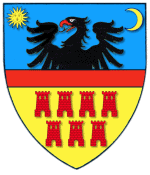 Transylvania Today: Transylvania Today:
January 2017
Backdrop:
As we have noted on numerous occasions, Hungarian minority rights continue to be a major issue for the American Hungarian Federation (AHF). What follows is a rundown of recent developments of concern to us in Transylvania.
 Ongoing theft without restitution of Hungarian properties: Ongoing theft without restitution of Hungarian properties:
Europe's third largest arboretum at Simeria (Piski) in Hunedoara County houses some 2,160 species of plants. For hundreds of years, it was the property of Transylvanian Hungarian nobility, the last being the Ocskay family. On March 2, 1949, the communists seized it and gave the family residing there in its palatial home thirty minutes to gather their belongings. They were then deported 200 km away to Târgu Mureş (Marosvásárhely).
 The palace at Piski is now used by the Romanian state as an institute for dendrological studies with much of the park largely abandoned. Since the change of regimes in Romania, the Ocskay family has tried through the court system to regain their illegally seized property, but without success. Regrettably, restitution is only partially practiced in Romania. The palace at Piski is now used by the Romanian state as an institute for dendrological studies with much of the park largely abandoned. Since the change of regimes in Romania, the Ocskay family has tried through the court system to regain their illegally seized property, but without success. Regrettably, restitution is only partially practiced in Romania.
Romanian assurances ignored:
The first of December is a Romanian national holiday. It commemorates the day of 1918, when an assembly of Transylvanian Romanians met in Alba Iulia (Gyulafehérvár) and proclaimed their wish to join the Kingdom of Romania. The meeting was neither a representative body nor did it call for a plebiscite, thus ignoring the wishes of the other ethnicities living in the region.
The proclamation of the meeting stipulated among other rights, "full national freedom for co-inhabiting peoples, with each people studying, managing, and judging in its own language.” There was to be “full freedom of the press, association, and meeting,” as well as “free propagation of all human thoughts." In addition, the declaration stipulated "the preservation of democratic local autonomy and the equality of all nationalities."
As a condition for entry into the European Union (EU), Romania agreed to the Copenhagen criteria that upholds democracy, the rule of law, human rights, and protection of minorities. Per the Venice Commission, this convention applies to any ethnic group that forms a historic and current minority in a well-defined area.
Despite these assurances, according to news reports, during the last four years prefects representing the government in Bucharest launched 120 legal processes against minority use of their signs, symbols, or their own language. Furthermore, a government decree that monuments related to Hungarian events must also display a sign in Hungarian has not been fulfilled.
It is therefore not unusual that politicians, like Traian Băsescu, make wild extraterritorial claims to the effect that Romania extends to the river Tisza, which is well inside Hungary.
The sub-prefect of Timiş (Temes) County, Zoltán Marossy, was dismissed from his job by Dacian Cioloş, the prime minister, because he mentioned that Romania needs to recognize the need for autonomy of certain regions.
Governmental tools used to hasten assimilation of the Hungarian minority:
The schools maintained by the diverse Hungarian churches, including Catholic, Protestant, and Unitarian, are where children learn the language of their ethnicity. The Romanian method of hastening assimilation is to deprive these churches possession of their learning institutions. This includes questioning the legality of the ownership now in hands of these churches, refusing the return of the illegally seized church properties, and renationalizing any buildings which were returned.
A prime example involves the Catholic high school of Târgu Mureş (Marosvásárhely) that was restituted in 2004. From the early 20th century, the building housed the Unirea Romania and the II Rákoczi Ferenc schools. In the latter, the language of instruction was Hungarian. Only in 2014, did the authorities give an operating license to the school. However, recently the authorities declared that the license to operate was not valid, removed the principal, and forbade him from entering the school premises. The consequence was that the teachers could not be paid, nor could the contractors who deliver school supplies. The case is unresolved as of this writing.
Potentially, very serious consequences may ensue if the authorities continue to use the legal system to deprive minorities from re-establishing the schools that under Communism were illegally seized. Several hundred restituted buildings are used for education at all levels. As the renationalization of the Székely Mikό College showed, regardless of the proof of ownership, the authorities do not hold property rights to be very important despite all the signed assurances they have made.
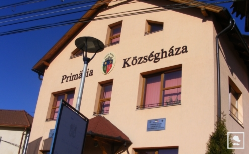 Governmental objection to the use of Hungarian words: Governmental objection to the use of Hungarian words:
Although the Romanian government recognizes the principle of freedom of speech, legally it tries to limit the use of minority languages, including in signs where they are publicly displayed. The objection to the use of Községháza, with the identical Primăria in Romanian also displayed on community houses in predominantly Hungarian speaking districts, continues.
The falsity of the claim that there is no equivalent to the Hungarian word in Romanian has been demonstrated as in several dictionaries there indeed exists an equivalent word. With the legal system refusing to acknowledge this fact, the only recourse remains referral to the European Court of Justice.
Fortunately, a law proposed by Bogdan Diaconu to punish those who use flags that display the symbols of the minority with a fine roughly twice the average monthly wage was rejected by the Romanian Parliament at the end of December.
 Rejection of Hungarian Rejection of Hungarian
World Heritage Site:
Every year at Pentecost, several hundred thousand ethnic Hungarians take part in the pilgrimage at Şumuleu Ciuc (Csiksomlyό), which commemorates the victory of 1567 at Pentecost against the King who wanted to convert the Szeklers to the Protestant faith. The local monks dubbed this as a miracle, providing the incentive to start the pilgrimage.
In 2012, the Romániai Magyar Demokratikus Szövetség (RMDSZ) representing the Hungarian population in Transylvania, and as a member of the government, suggested that the government should apply to UNESCO to declare Şumuleu Ciuc (Csiksomlyό) a World Heritage Site. The application was drafted based on the expert opinion of over 100 analysts. Even though the application was judged to be complete, at the meeting where it was to be voted on it was rejected as “incomplete.”
Sadly, the Romanians present at the meeting applauded the rejection of the application. Hearing the results, the Hungarian politicians vowed to resubmit the application and demanded the ouster of the Romanian Minister of Culture, Corina Şuteu, who, per the RMDSZ, blocked the application.
Transparency International on Romanian corruption:
According to a recent report by Transparency International, 29% of Romanian families reported having paid bribes in their daily dealings. In the European Union (EU), this is the most wide-spread corruption of any member country. Overall in the EU, only one family out of twenty paid bribes.
----
Contributed by Csaba K. Zoltani, editor of Transylvania Today: Diversity at Risk. (2013), for the American Hungarian Foundation (AHF)
[< Go to all AHF news] |
 Transylvania Today Transylvania Today
Founded over 100 years ago, the American Hungarian Federation (“AHF”) has for decades promoted human and minority rights, including the rights of Hungarians living in the countries neighboring Hungary.
AHF's International Relations Committee is proud to announce, consistent with andin furtherance of its continuing and long-standing tradition and mission, AHF launched a new initiative -- quarterly, brief updates relating to the Hungarian minority in Transylvania.
Shortcuts
Why So Many Hungarians Across the Border?
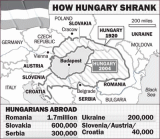 One thousand years of nation building successfully delineated groups based on culture, religion, geography, and other attributes to create the countries with which we are so familiar. While some Western European nations would continue power struggles and princely battles and civil wars, Hungary, founded in 896, was a peaceful multi-ethnic state for a 1000 years and her borders were virtually unchanged. Until 1920... One thousand years of nation building successfully delineated groups based on culture, religion, geography, and other attributes to create the countries with which we are so familiar. While some Western European nations would continue power struggles and princely battles and civil wars, Hungary, founded in 896, was a peaceful multi-ethnic state for a 1000 years and her borders were virtually unchanged. Until 1920...
The Treaty of Trianon in 1920... in the aftermath of WWI, was extremely harsh on Hungary and unjustifiably one-sided. The resulting "treaty" lost Hungary an unprecedented 2/3 of her territory, and 1/2 of her total population or 1/3 of her Hungarian-speaking population. Add to this the loss of up to 90% of vast natural resources, industry, railways, and other infrastructure. The clear winner of the land grab, was Rumania, who, established only 60 years earlier, more than doubled in size overnight.
Ethnic Distribution in the Kingdom of Hungary in 1910 (Hungarians shown in red)
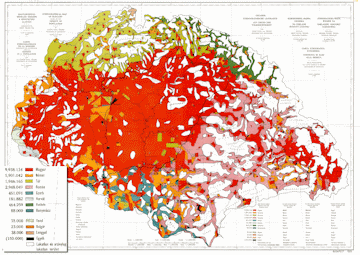
[download extra large image 4962x3509]
[download large image 1000x707]
Hungarian populations declined significantly after forced removals such as the Benes Decrees and other pograms, the effects of WWI, and Trianon in 1920. With continued pressure and discriminative policies such as the 2009 Slovak Language Law, this trend continued over the past 90 years.
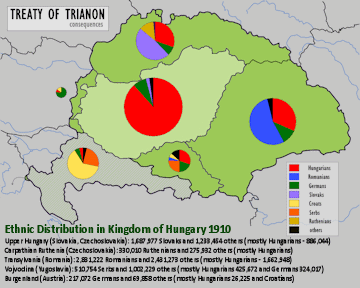
- In Upper Hungary (awarded to Slovakia, Czechoslovakia): 1,687,977 Slovaks and 1,233,454 others (mostly Hungarians - 886,044, Germans, Ruthenians and Roma) [according to the 1921 census, however, there were 1,941,942 Slovaks and 1,058,928 others]
- In Carpathian Ruthenia (awarded to Czechoslovakia): 330,010 Ruthenians and 275,932 others (mostly Hungarians, Germans, Romanians, and Slovaks)
- In Transylvania (awarded to Romania): 2,831,222 Romanians (53.8%) and 2,431,273 others (mostly Hungarians - 1,662,948 (31.6%) and Germans - 563,087 (10.7%)). The 1919 and 1920 Transylvanian censuses indicate a greater percentage of Romanians (57.1%/57.3%) and a smaller Hungarian minority (26.5%/25.5%)
- In Vojvodina 510,754 Serbs and 1,002,229 others (mostly Hungarians 425,672 and Germans 324,017)
- In Vojvodina and Croatia-Slavonia combined (awarded to Yugoslavia): 2,756,000 Croats and Serbs and 1,366,000 others (mostly Hungarians and Germans)
- In Burgenland (awarded to Austria): 217,072 Germans and 69,858 others (mainly Croatian and Hungarian)
[read more on the Treaty of Trianon]
AHF Statements on Trianon:
Selected AHF Articles on Rumania:
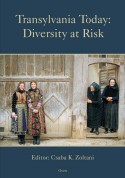 6/17/2014 - AHF Book Review: "Transylvania Today: Diversity at Risk," edited by Csaba Zoltani. Written by noted experts, describes the issues faced by minorities in Transylvania in their effort to retain their identity in an adverse environment. The essays of the book capture some of the fault lines in Transylvania, created by the incorporation of a territory with western traditions into one of Byzantine culture. Minorities, according to the official census, constitute nearly one-quarter of the population of Romania. Contributors include Amb. Geza Jeszenszky, Prof. Andrew Ludanyi, Tilhamer Czika, Viktor Segesvary, and Andreas Bereznay. [read more] 6/17/2014 - AHF Book Review: "Transylvania Today: Diversity at Risk," edited by Csaba Zoltani. Written by noted experts, describes the issues faced by minorities in Transylvania in their effort to retain their identity in an adverse environment. The essays of the book capture some of the fault lines in Transylvania, created by the incorporation of a territory with western traditions into one of Byzantine culture. Minorities, according to the official census, constitute nearly one-quarter of the population of Romania. Contributors include Amb. Geza Jeszenszky, Prof. Andrew Ludanyi, Tilhamer Czika, Viktor Segesvary, and Andreas Bereznay. [read more]
 Congressmen Frank R.Wolf (R-VA) and James P. McGovern (D-MA), Co-Chairmen of the Tom Lantos Human Rights Commission of the United States Congress, echo AHF's call, and send a letter to Traian Basescu, President of Romania, in connection with Bishop Tokes and the threatened revocation of the Order of the Star of Romania. [read more] Congressmen Frank R.Wolf (R-VA) and James P. McGovern (D-MA), Co-Chairmen of the Tom Lantos Human Rights Commission of the United States Congress, echo AHF's call, and send a letter to Traian Basescu, President of Romania, in connection with Bishop Tokes and the threatened revocation of the Order of the Star of Romania. [read more]
 Amerikai képviselők tiltakoznak Tőkés László miatt: Frank Wolf és James McGovern amerikai kongresszusi képviselők, a Tom Lantos emberjogi bizottság társelnökei tiltakozó levelet küldtek Traian Basescu román elnöknek, amiért Tőkés László kitüntetését Románia visszavette. [tovább] Amerikai képviselők tiltakoznak Tőkés László miatt: Frank Wolf és James McGovern amerikai kongresszusi képviselők, a Tom Lantos emberjogi bizottság társelnökei tiltakozó levelet küldtek Traian Basescu román elnöknek, amiért Tőkés László kitüntetését Románia visszavette. [tovább]
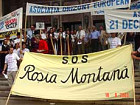 1/15/2014 - In 2009, PBS Television presented a documentary
film on the planned open pit cyanide gold mine at Verespatak in Transylvania,
now called Rosia Montana. In 2014, the Unitarian Church of Transylvania produced this English-language video entitled "Life over Gold - a Unitarian stand for Roşia Montană." [read more] and view both videos. 1/15/2014 - In 2009, PBS Television presented a documentary
film on the planned open pit cyanide gold mine at Verespatak in Transylvania,
now called Rosia Montana. In 2014, the Unitarian Church of Transylvania produced this English-language video entitled "Life over Gold - a Unitarian stand for Roşia Montană." [read more] and view both videos.
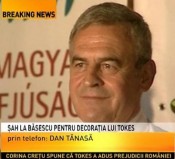 11/24/2013 - Romania revokes the Knight's Order of the "Star of Romania" from hero of the Romanian Revolution, Bishop László Tőkés. AHF writes to the US Helsinki Commission on this latest anti-Hungarian measure: "The Federation respectfully and strongly urges you to publicly on behalf of the Helsinki Commission raise Romania’s most recent anti-Hungarian phenomenon – the revocation of the Medal Star of Romania previously awarded Bishop Laszlo Tokes for his extraordinarily courageous role in toppling the Ceaucescu dictatorship during the 1989 revolution. And what was Bishop Tokes’s transgression resulting in the revocation? Exercising his constitutional rights by standing up for the interests of the Hungarian minority in Romania. The revocation should be reversed." The revocation comes years of a coordinated smear campaign against him. [read more] 11/24/2013 - Romania revokes the Knight's Order of the "Star of Romania" from hero of the Romanian Revolution, Bishop László Tőkés. AHF writes to the US Helsinki Commission on this latest anti-Hungarian measure: "The Federation respectfully and strongly urges you to publicly on behalf of the Helsinki Commission raise Romania’s most recent anti-Hungarian phenomenon – the revocation of the Medal Star of Romania previously awarded Bishop Laszlo Tokes for his extraordinarily courageous role in toppling the Ceaucescu dictatorship during the 1989 revolution. And what was Bishop Tokes’s transgression resulting in the revocation? Exercising his constitutional rights by standing up for the interests of the Hungarian minority in Romania. The revocation should be reversed." The revocation comes years of a coordinated smear campaign against him. [read more]
 Tőkés kitüntetése - Az amerikai Helsinki Bizottsághoz fordult az Amerikai Magyar Szövetség (Forrás: MTI | 2013. november 25) Tőkés kitüntetése - Az amerikai Helsinki Bizottsághoz fordult az Amerikai Magyar Szövetség (Forrás: MTI | 2013. november 25)
Levélben sürgette az Amerikai Magyar Szövetség (AMSZ) elnöke az amerikai Helsinki Bizottság két társelnökét, hogy mint az emberi jogok megsértését és magyarellenes jelenséget nyilvánosan vessék fel az általuk vezetett testület nevében, hogy semmisítsék meg Tőkés László kitüntetésének visszavonását. [tovább]
 6/19/2013 - AHF submits memorandum to US Helsinki Commission in follow up to both the Congressional letter to Secretary John Kerry requesting that the “State Department vigorously engage the Romanian government to end the travesty of justice which it has perpetuated by failing to fully restitute properties illegally confiscated from religious denominations after 1945" and AHF's April 25th meeting with the Commission during which AHF expressed its deep concern about threats to democracy and human rights arising from discriminatory actions and policies affecting members of the Hungarian minority in some of the countries of Central and Eastern Europe. [read more] 6/19/2013 - AHF submits memorandum to US Helsinki Commission in follow up to both the Congressional letter to Secretary John Kerry requesting that the “State Department vigorously engage the Romanian government to end the travesty of justice which it has perpetuated by failing to fully restitute properties illegally confiscated from religious denominations after 1945" and AHF's April 25th meeting with the Commission during which AHF expressed its deep concern about threats to democracy and human rights arising from discriminatory actions and policies affecting members of the Hungarian minority in some of the countries of Central and Eastern Europe. [read more]
 6/19/2013 - Kiállást vár az amerikai Helsinki Bizottságtól az Amerikai Magyar Szövetség: Az Amerikai Magyar Szövetség feljegyzésben szólította fel ismételten a szervezetet, hogy június 27-ig "nyilvánosan és bizalmasan is vesse fel" a romániai egyházi és közösségi javak, beleértve a levéltárak igazságos és azonnali visszaszolgáltatásának kérdését. [tovább] 6/19/2013 - Kiállást vár az amerikai Helsinki Bizottságtól az Amerikai Magyar Szövetség: Az Amerikai Magyar Szövetség feljegyzésben szólította fel ismételten a szervezetet, hogy június 27-ig "nyilvánosan és bizalmasan is vesse fel" a romániai egyházi és közösségi javak, beleértve a levéltárak igazságos és azonnali visszaszolgáltatásának kérdését. [tovább]
 6/19/2013 - Kiállást vár az amerikai Helsinki Bizottságtól az Amerikai Magyar Szövetség: Az Amerikai Magyar Szövetség feljegyzésben szólította fel ismételten a szervezetet, hogy június 27-ig "nyilvánosan és bizalmasan is vesse fel" a romániai egyházi és közösségi javak, beleértve a levéltárak igazságos és azonnali visszaszolgáltatásának kérdését. [tovább] 6/19/2013 - Kiállást vár az amerikai Helsinki Bizottságtól az Amerikai Magyar Szövetség: Az Amerikai Magyar Szövetség feljegyzésben szólította fel ismételten a szervezetet, hogy június 27-ig "nyilvánosan és bizalmasan is vesse fel" a romániai egyházi és közösségi javak, beleértve a levéltárak igazságos és azonnali visszaszolgáltatásának kérdését. [tovább]
-
AHF expresses concerns for Hungarian Minority in Rumania to Vice President Joe Biden
 1/12/10 -- The American Hungarian Federation urged Vice President Biden to discuss policies with his "Romanian interlocutors that they should adopt to strengthen Romania's democratic institutions and respect the rights of its Hungarian minority" during his trip to Romania. Frank Koszorus, Jr., co-president and chairman of the Federation's International Relations Committee reports, "We understand that issues relating to the Hungarian minority were raised." [Read more] The letter to the Vice President included a statement on AHF's concerns for the Hungarian minority in Transylvania. 1/12/10 -- The American Hungarian Federation urged Vice President Biden to discuss policies with his "Romanian interlocutors that they should adopt to strengthen Romania's democratic institutions and respect the rights of its Hungarian minority" during his trip to Romania. Frank Koszorus, Jr., co-president and chairman of the Federation's International Relations Committee reports, "We understand that issues relating to the Hungarian minority were raised." [Read more] The letter to the Vice President included a statement on AHF's concerns for the Hungarian minority in Transylvania.
 4/7/2010 -- AHF article on Autonomy for Romania's Hungarian Communities published in Foreign Policy Review...The article entitled, "Autonomy: The Path to Democracy and Stability in Romania," makes a compelling case for the recognition of autonomy as a means of strengthening democracy and stability in Romania. [read more] 4/7/2010 -- AHF article on Autonomy for Romania's Hungarian Communities published in Foreign Policy Review...The article entitled, "Autonomy: The Path to Democracy and Stability in Romania," makes a compelling case for the recognition of autonomy as a means of strengthening democracy and stability in Romania. [read more]
 AHF Reacts to Senator Benjamin L. Cardin (D-MD), Co-Chairman of the U.S. Helsinki Commission, who questioned democracy in Hungary and criticized expressions of concern for Hungarian minorities. AHF's letter expressed its steadfast conviction that judgments be "objective, fair, balanced and based on facts and not generalizations and speculation." It also urged the Helsinki Commission not to ignore the Hungarian minorities but to publicly and privately encourage Slovakia and Romania "to build tolerant societies by respecting the rights of their Hungarian and other minorities and the rule of law." [read more] AHF Reacts to Senator Benjamin L. Cardin (D-MD), Co-Chairman of the U.S. Helsinki Commission, who questioned democracy in Hungary and criticized expressions of concern for Hungarian minorities. AHF's letter expressed its steadfast conviction that judgments be "objective, fair, balanced and based on facts and not generalizations and speculation." It also urged the Helsinki Commission not to ignore the Hungarian minorities but to publicly and privately encourage Slovakia and Romania "to build tolerant societies by respecting the rights of their Hungarian and other minorities and the rule of law." [read more]
 Levelet írt az egyik szenátornak az Amerikai Magyar Szövetség [tovább] Levelet írt az egyik szenátornak az Amerikai Magyar Szövetség [tovább]
Miért támadja Magyarországot az amerikai szenátor? [tovább]
 American-Hungarian federation strike back at US senator... [read more] American-Hungarian federation strike back at US senator... [read more]
- AHF Concerns related to the Hungarian Minority in Transylvania
- Controversy at the Babes-Bolyai State University
- Church and Synagogue Property Confiscation
- "There are no Nationalities in Romania" The American Hungarian Federation Co-Hosts Lecture by Bishop Arpad Szabo from Kolozsvar
- Révai Miklós emléktábla Nagycsanádon
- Rumania's Basescu in the US
- AHF on Dual Citizenship for Hungarians
- The Csango Hungarians of Moldavia
- The Tragedy of the Treaty of Trianon
- An Essay on the foundations of Rumanian Identity, Nationalism and Ethnic Cleansing - CONCEPTUAL CONFUSIONS CONCERNING THE ROMANIAN IDENTITY: NEAM AND POPOR AS EXPRESSIONS OF ETHNO-NATIONALISM (PART 3) - "...the motivation and the goal was common: racially determined mass murder." (Appeared in RFE/RFL Newsline, 6/5/2005 By Victor Neumann, professor of history at the West University of Timisoara, Romania.) [download]
 You will need the free Adobe Reader to open the following files. Click the image to download. You will need the free Adobe Reader to open the following files. Click the image to download.
Articles and Essays by AHF Members
- "NATO Enlargement" by Frank Koszorus Jr. March 29, 2004
Remarks on the Occasion of the Enlargement of NATO, Corcoran Gallery of Art, Washington, D.C. [download]
---
- "Nato Enlargement And Minority Rights: Prerequisites To Security" by Frank Koszorus, Jr., April 2003
A memorandum that was submitted to Robert A. Bradtke, Deputy Assistant Secretary for European and Eurasian Affairs, and Heather A. Conley, Deputy Assistant Secretary for European and Eurasian Affairs during a roundtable discussion on "NATO Enlargement and the Current State of the Trans-Atlantic Alliance." This submission follows several other intiatives, including submissions to Lord Roberston, Secretary General of NATO. [download]
---
- “Nato Enlargement: Promoting Western Values, Strengthening The Alliance” by Frank Koszorus, Jr., April 29, 2003
A Statement Before The United States Senate Committee On Foreign Relations.
[download]
---
- "U.S. Senate Unanimously Ratifies Nato Treaty; Senators Raise Rights Of Minorities: Federation Supports Efforts Aimed At Encouraging Romania And Slovakia To Respect Rights Of Hungarian Minorities And Restore Communal Properties" - Press Release by Zoltan Bagdy, May 9, 2003 [download]
Congressional Resolutions and Records
- H.RES 191 - A RESOLUTION urging the "prompt and fair restitution of church properties by Romania and Slovakia - TOM LANTOS / TOM TANCREDO (April 6th 2005) in the House of Representatives [download]
- A RESOLUTION REGARDING THE ISSUE OF TRANSYLVANIAN HUNGARIANS -- HON. DONALD E. `BUZ' LUKENS (Extension of Remarks - February 26, 1990) in the House of Representatives [download]
- VIOLENCE IN TRANSYLVANIA -- HON. DON RITTER (Extension of Remarks - March 22, 1990) in the House of Representatives [download]
- Transylvanian Monitor #14: Property Restitution.
Join online!

|



